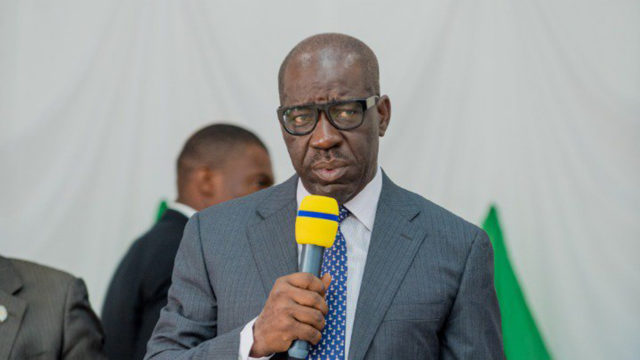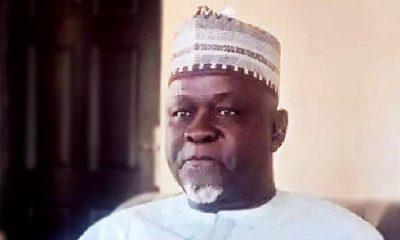News
Adamawa Guber: Court Refuses To Extend Order Stopping INEC’S Prosecution Of REC
Published
10 months agoon
By
Editor
The Federal High Court in Abuja on Tuesday, refused to extend its July 10 interim order stopping the Independent National Electoral Commission (INEC), Inspector General of Police (IGP) and the Attorney General of the Federation (AGF) from prosecuting the suspended Adamawa State Resident Electoral Commissioner (REC), Hudu Yunusa Ari pending the hearing and determination of a motion filed by Senator Aishatu Dahiru, also known as Binani.
INEC is seeking the prosecution of the suspended REC for declaring the governorship candidate of the All Progressives Congress (APC), Senator Aisha Binani winner of the Adamawa state governorship election on April 15, 2023.
The court had ordered parties in the motion filed by Binani, which had INEC, IGP and the AGF as defendants to maintain the status quo pending the determination of the substantive suit.
READ ALSO: Court Strikes Out 10bn Defamation Suit Against Taraba Truth And Facts
The Court also asked the defendants to appear before it on July 18 to show cause while they should not be permanently restrained from prosecuting the suspended Adamawa State REC.
At Tuesday’s proceedings, INEC’s counsel, Mr. Rotimi Jacobs (SAN) told the court that the applicant had not served the defendants with the July 10 order of the court.
Jacobs, who also told the court that, the defendants have not been served with the originating summons filed by Binani had, in a counter affidavit to the motion challenged the competence and the jurisdiction of the court to entertain the matter.
He told the court that the life span of the interim order elapsed on July 18.
However, counsel to Binani, Michael Aondoaka (SAN) argued that the interim order has not elapsed as the defendants have not shown cause as directed by the court.
READ ALSO: BREAKING: INEC Files 6-count Charge Against Suspended Adamawa REC
According to Aondoaka, counsel to INEC cannot say he was not served with the processes of the court as he had joined issues in the matter.
Justice Donatus Okorowo, however, adjourned the matter till Monday, July 24 for hearing the originating summons served on the defendants in court on Tuesday.
The court refused to extend the interim order stopping the prosecution of the suspended Adamawa state REC.
In the suit marked, ABJ/CS/935/2023, the applicant is seeking the interpretation of section 144 of the Electoral Act 2022 by the court and a preservative order seeking the maintenance of status quo in the matter pending the determination of the suit.
Aondoaka, in the application, drew the attention of the court to the fact that the matter is before a tribunal and is time-bound, whereas the star witness to his client, Hudu Yunusa Ari is being harassed and prevented from giving evidence before the tribunal which if continued, would jeopardize the case of his client at the tribunal.
READ ALSO: Adamawa: Court Dismisses Binani’s Suit Against INEC
He therefore, urged the court to halt the harassment of the star witness in the petition before a governorship election petition tribunal challenging INEC’s declaration of a Peoples Democratic Party (PDP) candidate and governor of the state, Ahmadu Fintiri as the winner on Sunday, April 16, 2023.
The lawyer told the court that according to the relevant laws, since the applicant has been declared by the INEC, the declaration can only be legally and authentically reversed if need be, by a court of competent jurisdiction or a tribunal.
Senator Binani had earlier, through her counsel, Mohammed Sheriff filed a suit before a sister court presided over by Justice Inyang Ekwo which was, however, dismissed following a notice of discontinuance filed by the applicant.
The Adamawa State governorship supplementary election was conducted on April 15 following the declaration of the March 18 poll as inconclusive over alleged irregularities.
After voting ended, the collation of results began at the state collation centre but the exercise was suspended after results from 10 LGAs were announced.
However, Hudu Yunusa-Ari, the state’s Resident Electoral Commissioner, declared Senator Binani as the winner before the collation resumed on April 16.
Yunusa-Ari made the declaration when outstanding results were yet to be announced. The Independent National Electoral Commission (INEC) subsequently described his action as illegal and null and void.
INEC also suspended him and is determined to prosecute him for electoral malpractice.
You may like


JUST IN: Supreme Court Reserves Judgment On Binani’s Appeal Against Adamawa Gov


JUST IN: Appeal Court Affirms Fintiri As Adamawa Gov, Dismisses Binani’s Appeal


JUST IN: Court Stops Prosecution Of Suspended Adamawa REC


Again, Binani Drags INEC To Court Over Nullification Of Declaration


BREAKING: INEC Files 6-count Charge Against Suspended Adamawa REC


Suspended Adamawa REC Gets Bail

The West African Examinations Council, Nigeria, has said the West African Senior School Certificate Examination for school candidates will commence on Tuesday, April 30, 2024 and end on June 24, 2024.
Speaking on Monday at the WAEC Lagos Office, Head of Nigeria Office, Dr Amos Dangut, said the council was ready to conduct the examination.
Dangut said, “I am delighted to inform you that WASSCE for School Candidates, 2024 will take place between Tuesday, April 30 and Monday, June 24, 2024, in Nigeria, spanning seven weeks and six days. The examination will be conducted in four WAEC member countries, namely: Nigeria, Gambia, Sierra-Leone and Liberia.”
“We want to intimate candidates of the council’s readiness to conduct WASSCE. ”
He added, “We are set for the conduct of WASSCE for School Candidates, in 2024 in Nigeria. The Council also, in collaboration with the Federal Ministry of Education, the State Ministries of Education, the Nigeria Police, other security agencies and other stakeholders, deliver, on its mandate to conduct credible examinations for the Nigerian Child and the general public.
“We remain ever grateful to the Honourable Minister of Education, the Honourable Minister of State, for Education, all the State Ministries of Education, the Inspector-General of Police, and indeed, all our stakeholders, for their usual support and cooperation, even as we count on them once again.”
News
Jubilation As Obaseki Raises Minimum Wage To N70,000
Published
56 mins agoon
April 29, 2024By
Editor
The Edo State Governor, Godwin Obaseki, has increased the minimum wage for workers in the state from N40,000 to N70,000.
The governor made the announcement at the inauguration of the newly built ultra-modern Labour House secretariat complex for labour unions in the state, along Temboga Road, Ikpoba-Hill, Benin City.
READ ALSO: Why I Hate Mohbad More In Death – Naira Marley’s Associate
Details shortly…

By Lasisi Olagunju
One day, I will have the courage to ask the immaculate Ooni of Ife, Oba Enitan Ogunwusi, how he feels each time he travels on the horrible Ibadan-Ife road. Ben Okri, ‘The Famished Road’ storyteller, finds his own ‘road’ a torment – he says it “leads home and then away from it, without end.” Okri thinks the road a torment because he meets it “with too many signs and no direction.” The Ife-Ibadan road has signs, it has directions – and I find them very treacherously significant because they interlock fingers while road users lose life and limbs. The road has signs and directions to the very bowel of hell.
Olojo, the guardian divinity of the House of Oduduwa, is the famed owner of two machetes: with one machete, he prepares the field for the plants of tomorrow; with the other, he clears the road for prosperity (Ó fì’kan sán’ko/ Ó fì kan yè’nà). Those weapons must either now be blunt or lost. An Odu Ifa tells us something about Ile Ife and roads. It affirms that well-paved open roads start from Ile Ife. That affirmation today can only be treated on the operating theatre of irony. Could it be that truth has an expiry date and Ogbe’s truth of good, open roads in Ile Ife has expired? What we see today from the capital of Yorubaland (Ibadan) to the historical source of Yoruba people is the torment of a closed road that mocks the pathfinder-spirit of Oduduwa. The road does worse with its gaping craters and their threats of morphing into greater gullies. And it is a federal road.
Has the Ooni ever told the president that the worst road in the universe leads to his kingdom? Has he told the president that the N79.8 billion contract for the reconstruction of Ibadan-Ife-Ilesa road awarded in September, 2019 by his friend and villa mate, Muhammadu Buhari, has remained a contract for ghosts? Has he invited the president’s attention to the truth that since last year when he took over, the road has sunk even deeper in the mire of decrepitude? And, that even FERMA, a perennially rich agency that pretends giving palliatives on federal roads, has since seen the futility of stitching this rag? Or could it be that Kabiyesi does what our presidents since 1999 do – escaping road users’ pains by flying over our heads?
FROM THE AUTHOR: OPINION: Bobrisky’s Masque, Yahaya Bello’s Boa
The reigning culture here is rooted in the ragged soils of our toil. I admit that badness is not peculiar to the Ife-Ibadan-Ilesa road. It is a national affliction that can’t be cured because of the greed of doctors who treat sick roads with fake and expired drugs.
We work hard to build roads that wear out before they are inaugurated. We have the interminable construction mess called Lagos-Ibadan Expressway. When did construction start there? When will it end – if it will ever end? How much have we sunk there? And, is it not a shame that the road is ready already for corrective surgery even before its makers are done making it? If you are a woman, and you are pregnant and your doctor tells you dancing is a ‘safe and fun way to exercise’, do not dance to the break beats of that road. It is made for abortion.
Ben Okri says “all roads lead to death” and “some roads lead to things which can never be finished.” Is that why our federal government’s roads are forever ongoing, none is ever finished or completed? Federal government’s statistics says out of Nigeria’s national road network of 200,000 kilometers, 36,289 km belong to it. Now, you ask Abuja which of its other roads, apart from the one from the Villa to Abuja airport, is good? Ask them why almost all roads that wear federal tags suffer neglect, abandonment or crass abuse.
My NYSC journey to the far north 34 years ago was on the Ibadan-Ilorin-Jebba-Mokwa-Yauri road. It was an experience in pleasantness. It is, today, a monument to frustration, a shrine to demons that feed on losses -human and material. The Ibadan-Oyo-Ogbomoso part of that road is one major reason why Nigeria should not have a federal government – or have roads managed by the Federal Government. There should be a coroner’s inquest on why that road was killed and who killed it. Without the states, the vehicle of Nigeria would have long lost its chassis. States keep doing what heart surgeons do when arteries are found blocked. They create bypasses, byways. A brand new 78-kilometre Iseyin-Ogbomosho road has just been built by Seyi Makinde’s Oyo State to escape the Federal Government’s death trap along that axis. A commenter online wrote: “The road has helped us to link northern Nigeria without using the dangerous Oyo-Ilorin road that has consumed so many lives…” The Oyo-Ilorin road of death spoken of here belongs to the government in Abuja.
FROM THE AUTHOR: OPINION: For Yoruba Muslims And Pentecostals
Potholes jolt us to appreciate what bad roads represent in our lives. They tell us why the tyres of our country never last and why our rides are forever bumpy. Asking questions on why our roads are perennially bad is living the times of Ayi Kwei Armah’s ‘Two Thousand Seasons’: “A thousand seasons wasted wandering amazed along alien roads, another thousand spent finding paths to the living way.” Like Ouroboros, the self-tail-devourer, Nigeria’s ‘alien roads’ cyclically keep consuming the ‘living way.’
It is time to pound yam for the household, the idler among us goes for the heaviest pestle. This is better said in Yoruba: Òle bàá tì, ó gb’ódó nlá. There are abandoned federal roads everywhere which directly affect millions of Nigerians, but the government has moved the money to a 700km super coastal highway that will cost N15.6 trillion. The first phase is 47 kilometres, starting somewhere and ending nowhere, at a cost of N1.06 trillion. Should I just say that that N1 trillion will start and complete the reconstruction of decrepit Ibadan-Ife-Ilesa Road (224km), Ilorin to Bida (244.9km) and Shagamu to Benin (492km) if wisdom wills? Even at an inflated cost of N1 billion per kilometre, our husbands will achieve these and will even ‘collect change’. And Tinubu would have become very popular with it. But he wants a white elephant and has moved our money to purchase it.
White elephants are always expensive! Poet and journalist, Mathew Wills, in his ‘The Original White Elephant’ defines ‘white elephant’ as “something excessive that turns out to be valueless.” James A. Robinson and Ragnar Torvik in 2005 published an interesting article about the third world and deliberate bad investments – they titled their article: ‘White Elephants’. In that piece, they hold that politicians around here would always go for “white elephants” as against “socially efficient projects” because “the political benefits are large compared to the surplus generated by efficient projects.” That piece says much more than this. It is published in the Journal of Public Economics 89 (2005: 197-210). I think you should read it.
‘The Stolen White Elephant’ by Mark Twain is an interesting story on the cost of investing in big, expensive loss centres. It is the story of a fictional Kingdom of Siam. A reviewer says Siam is blessed with a “national appetite for fraud”. Another says it has officers of “pompous assumption of infallibility and ridiculous inappropriate procedures.” The “pointless” story is about an expensive search for a stolen white elephant, a further loss of hundreds of thousands of dollars in compensation and the eventual discovery of the rotting corpse of the supposedly stolen animal. The story ends with the duped narrator celebrating the man who duped him. It ends as the man pronounces himself “a ruined man and a wanderer in the earth.” In Studies in American Humour, Peter Messent (1995) does a lot of justice to it in his ‘Keeping Both Eyes Open.’ The whole story sounds Nigerian; what Fela called “expensive shit.” But I can argue that though we wander today, the past was a better experience.
FROM THE AUTHOR: OPINION: FG’s N90 Billion Hajj Politics
“How can you develop a country rapidly if you can’t get about it?” Sir Rex Niven, pre-independence Speaker of Northern Nigeria House of Assembly, asked that question 69 years ago in relation to the state of roads in Nigeria. On January 27, 1955, Riven was asked to brief the Royal African Society and the Royal Empire Society in London on “Recent Developments in Nigeria.” He gave a very detailed account of himself as a British participant in the affairs of a key component of the Nigerian federation. Sector by sector, he spoke about efforts and failures. He particularly spoke on roads which he described as “the most important of the great aspects of development.” He said as he was speaking (in 1955), Nigeria had over 30,000 miles of roads whereas in 1920, “she had hardly any at all.” Then he used Kabba (in present Kogi State) to illustrate what he was saying: “The first province I went to, the newly constituted Kabba Province, had exactly 4 miles of road…but when I left Kabba four years later, there were over 200 miles of road.” Thirteen years later, the same Niven, in retirement, told the Commonwealth section of the Royal African Society on 11 November, 1969 that Nigeria had 40,000 miles of quality roads. That figure was even in spite of the ongoing civil war. Now, you ask: Why are our golden years always in the past? The past was obviously better handled.

JUST IN: WASSCE Begins April 30
Jubilation As Obaseki Raises Minimum Wage To N70,000

OPINION: Sending Ooni Of Ife To Tinubu
Trending

 News5 days ago
News5 days agoDrama! Supporters Of Yahaya Bello Perform Rituals to Prevent His Arrest By EFCC [Video]

 News4 days ago
News4 days agoEdo: FRSC Threatens Sanction On Truck Drivers Loading Goods, Passengers Together

 Headline4 days ago
Headline4 days agoSaudi Arabia Opens First Alcohol Store, Nigerian Muslims React

 Metro5 days ago
Metro5 days agoEdo Cultists Kill Rival In Daughter’s Presence, Abandon Getaway Car

 Headline4 days ago
Headline4 days agoVIDEO: Meet Nigerian Pastor Who Predicted World Will End April 25

 News4 days ago
News4 days ago243 Passengers Cheat Death As Air Peace Plane Makes Emergency Landing At Lagos Airport

 Metro4 days ago
Metro4 days agoJUST IN: Four-year-old Boy Dies In Abuja School, Parents Suspect Foul Play

 Metro4 days ago
Metro4 days agoJUST IN: Protesters Storm APC Secretariat, Demand Ganduje’s Resignation

 Politics4 days ago
Politics4 days agoEdo Guber: PDP Unveils 200-member Campaign Council

 News4 days ago
News4 days agoEFCC Withdraws Appeal Against Former Kogi Gov, Bello

































